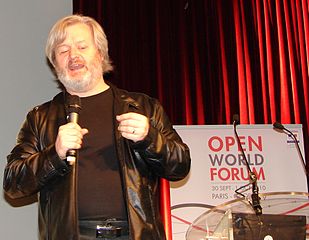
Summary: Useful analysis from Simon Phipps, who has turned more vocal in his opposition to software patents and those who promote them
Simon Phipps is a terrific leader. He is not self-censoring and over the years he has thrown some punches at companies which are hostile towards FOSS. He also built (or rebuilt) a relationship with the FSF, which helps reduce if not eliminate wasteful efforts such infighting and competitive advocacy; the OSI and FSF are now jointly submitting formal complaints against patent trolls. Phipps also spoke out repeatedly against patent trolls and patent aggressors -- something which many in the FOSS groups don't bother with. Here in Techrights, due to lack of time and resources, we have not focused so much on patents recently; so, here is something to make up for it.
Newegg is currently in the headlines because
it gets sued a lot by trolls and it fights back. 30 infringement claims were made against Newegg in the past 8 years alone, based on
Newegg's claims. To quote: "Newegg was founded "in the ashes of the Internet trough" in 2001, said Cheng. The first 10 employees worked in a warehouse about 20 miles outside Los Angeles. Newegg still owns the facility, called Warehouse 1, though the company's headquarters now resides in another warehouse in City of Industry.""
Newegg is not a massive giant like IBM, Apple, or Microsoft. It does not hoard patents and it is really suffering from patents, which are originally the game invented and played by the rich and the powerful. Also from Phipps (OSI President) there is
this coverage of OIN, which was created by massive multi-nationals, including IBM. Phipps explains: "While many open source advocates remain rightly concerned about the chilling effect of software patents on both innovation and collaboration, open source software has additional defenses against patent aggression that aren't available to proprietary software. The Open Invention Network (OIN), a novel patent pool fighting for rather than against open source, plays an important role in these defenses."
But OIN is still not fighting to eliminate software patents. It's more of an interest group. As Phipps put it, "make sure the software you use is under one of these modern licenses; older licenses like BSD and MIT don't mention patents. Second, comply with the terms of the license -- easy enough for almost all open source licenses, especially compared with the labyrinthine complexity of commercial licenses and EULAs. As long as you comply with the terms of the license, you benefit from the protection it offers. Third, work in the open rather than making last-minute contributions. This is good practice anyway, but it adds protection too."
So in other words, OSI may be benign to Free/Open Source software players; for everyone else it's not of much use. Newegg gets nothing out of it.
In another
new post from Phipps it is claims that Microsoft and IBM are just "big trolls" -- something he has said even back when he worked for Sun. "Rogue software patent trolls are the scourge of the tech industry. But the larger, better-dressed trolls don't get a pass either." Phipps writes.
To quote Phipps further: "The dirty secret IBM, Microsoft, and other self-proclaimed advocates of patent reform don't want you to know is that they are trolls, too. They have large and highly profitable business units using exactly the same tactics as the patent trolls they hate. The reason they hate the trolls is not because of what they do -- after all, IBM and Microsoft were the pioneers of treating patent portfolios as profit centers rather than cost centers. No, the reason they hate the trolls is because the trolls attack them with the weapons they themselves perfected."
We already explained how
IBM and Microsoft helped abolish patent reform attempts. This ought to make people who think of IBM as a friend of FOSS reassess their position; it is definitely
not the first time IBM does this. IBM's and Microsoft's friends at SUSE have
this new release (funded in part by Microsoft and IBM), but we should remember to regard it as nothing but an attempt to tax GNU/Linux with patents. We hardly cover anything SUSE-related anymore (we ignore rather than fight), but the fact remains that people should boycott SUSE. It's about patents.
⬆

